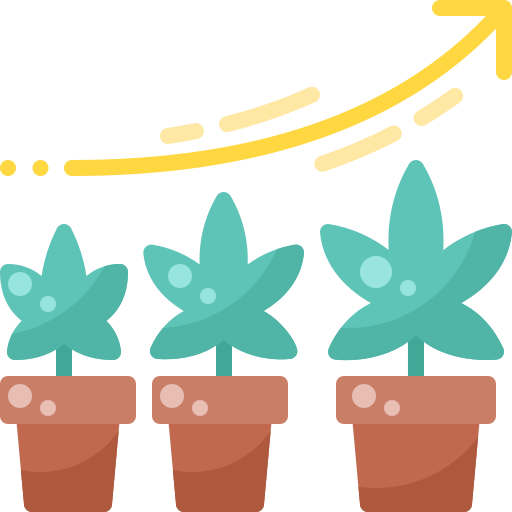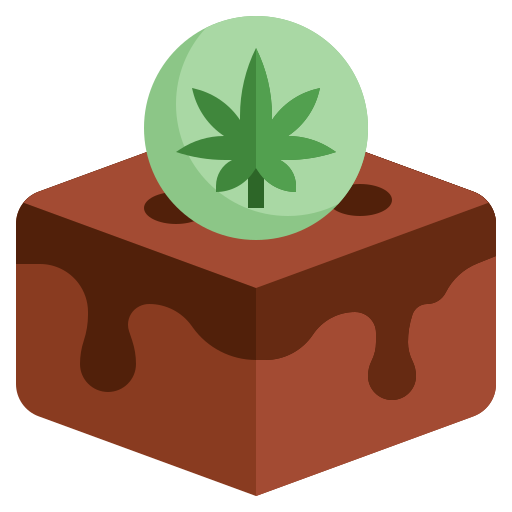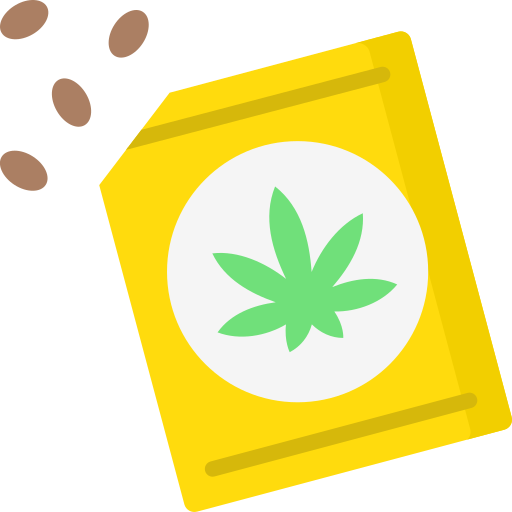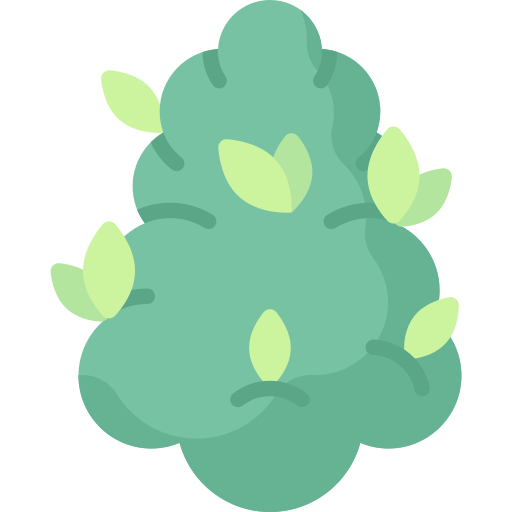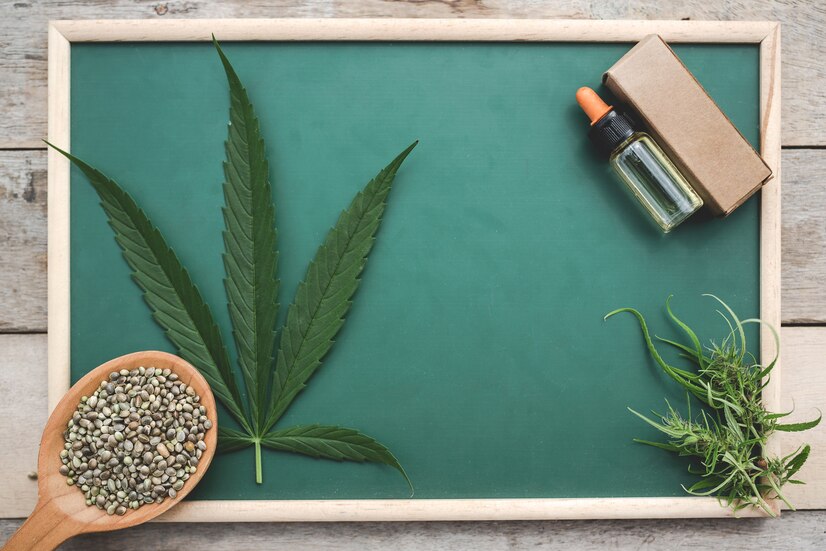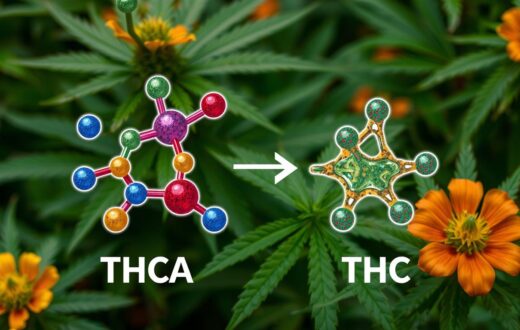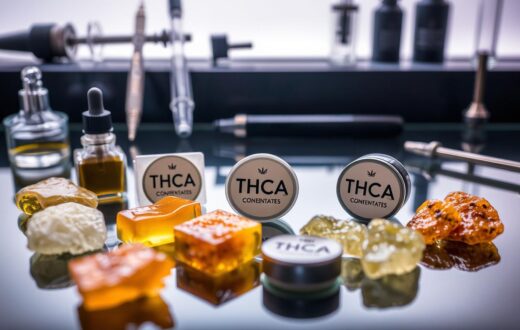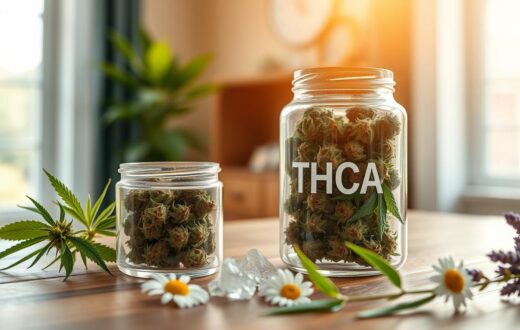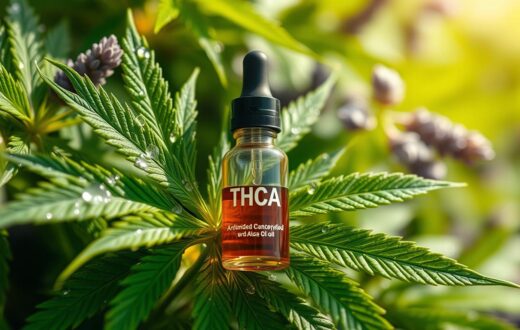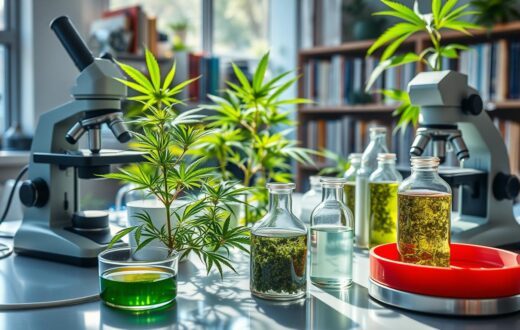Ever wondered why some cannabis products get you high while others don’t? The answer lies in the fascinating world of cannabinoids, particularly THCA and CBD. These compounds, found in hemp and cannabis plants, have sparked a revolution in wellness circles. But what sets them apart?
THCA, or tetrahydrocannabinolic acid, is the raw, non-psychoactive precursor to THC. It’s abundant in fresh cannabis plants and doesn’t produce a high in its natural state. On the flip side, CBD, or cannabidiol, is well-known for its calming effects without any intoxication.
The legal landscape for these compounds is a patchwork. While hemp-derived CBD with less than 0.3% THC is federally legal in the U.S., THCA’s status is more complex due to its potential to convert to THC. This transformation occurs when THCA is exposed to heat or light, a process called decarboxylation.
Both THCA and CBD are gaining traction in the wellness world. THCA tinctures, raw cannabis tinctures, and THC-A extracts are becoming popular for their potential therapeutic benefits. Similarly, hemp tinctures rich in CBD are sought after for their calming properties.
As we dive deeper into the world of THCA and CBD, we’ll explore their unique properties, benefits, and how they interact with our bodies. Whether you’re curious about cannabis tinctures or looking to understand the difference between these cannabinoids, this guide will shed light on the key distinctions between THCA and CBD.
What is THCA?
THCA, or tetrahydrocannabinolic acid, is a key compound found in raw cannabis plants. It’s a non-psychoactive precursor to THC and has gained attention for its potential health benefits. Let’s explore what makes THCA unique and why it’s becoming a topic of interest in the cannabis world.
Definition and Overview
THCA is the acidic form of THC present in fresh cannabis. Unlike its famous counterpart, THCA doesn’t produce a high. It’s abundant in raw and live cannabis plants, making up a significant portion of the plant’s chemical profile. When exposed to heat, THCA converts to THC, the compound responsible for marijuana’s psychoactive effects.
Natural Occurrence
You’ll find THCA in high concentrations in fresh cannabis flowers and leaves. It’s also present in smaller amounts in hemp and certain types of Echinacea. As the plant dries or is exposed to heat, THCA gradually transforms into THC. This process, known as decarboxylation, happens instantly when cannabis is smoked or vaporized.
Benefits and Uses
Research suggests THCA may offer various health benefits. Studies indicate potential anti-inflammatory, neuroprotective, and antiemetic properties. Some people consume THCA through raw cannabis juicing or unheated thc tinctures. These acid thc tinctures preserve THCA’s original form, allowing users to experience its effects without the high associated with THC. As interest grows, more research is needed to fully understand THCA’s therapeutic potential.
What is CBD?
CBD, short for cannabidiol, is a compound found in cannabis plants. It’s known for its health benefits without causing a “high.” This makes it popular for natural wellness support.
Definition and Overview
Cannabidiol is one of over 500 cannabinoids in cannabis. It doesn’t make you feel intoxicated. Its popularity is growing because of its potential health benefits and lack of psychoactive effects.
Natural Occurrence
Hemp-derived CBD is found naturally in hemp plants. These plants have less than 0.3% THC. Hemp is a great source for CBD because it meets federal regulations.
Benefits and Uses
Research on CBD’s benefits is ongoing. Early studies suggest it can help with anxiety, pain, and inflammation. CBD comes in many forms, like oils, tinctures, and edibles. This variety allows people to find the best way to use it for their needs.
Chemical Structures of THCA and CBD
THCA and CBD have different chemical structures. THCA is found in raw cannabis and has a unique structure. It has a carboxylic acid group, which is important for understanding its properties.
Molecular Composition
THCA’s chemical formula is C22H30O4. This shows its complex structure. It is found in unheated cannabis plants and doesn’t make you high.
CBD has a different atomic arrangement. It lacks the acid group found in THCA. This is why THCA doesn’t make you feel high in its raw form.
How They Interact with the Body
The structure of THCA and CBD affects how they work in our bodies. THCA doesn’t bind well to cannabinoid receptors. This is why it doesn’t make you feel high.
CBD, however, works differently. It interacts indirectly with the endocannabinoid system. This can help with conditions like epilepsy and inflammation.
Understanding the endocannabinoid system is crucial. It helps us see how THCA and CBD work. Research is showing how these differences lead to different health benefits.
Legal Status of THCA and CBD
The laws on THCA and CBD are complex and keep changing. CBD is easier to understand, as hemp-derived CBD is legal in the US. You can find legal cannabis tinctures with CBD in many places. But, the rules on hemp-derived THCA vary by state.
Federal Regulations
The 2018 Farm Bill made hemp and its products legal if they have less than 0.3% THC. This law opened a big market for THCA products like oils and edibles. Even though hemp-derived THCA is legal, its chance to turn into THC makes things tricky.
State Laws
State laws play a big role in what THCA and CBD products you can buy. Seven states – Arkansas, Minnesota, Oregon, Rhode Island, Idaho, New Hampshire, and South Dakota – don’t let THCA be shipped. Other states have different rules for THCA and CBD.
Some states allow both recreational and medical use of these products. Others only allow medical use. THCA products like Badder and Diamonds are sold in many places, with prices from $14.99 to $179.99. It’s important for both businesses and buyers to know the local laws. This knowledge is key in the hemp industry.
Effects on the Body
THCA and CBD are special cannabis compounds. They have unique ways of affecting our bodies. Let’s explore how they work and their benefits.
Psychoactive Properties of THCA
THCA is found in raw cannabis plants. It doesn’t make you feel high by itself. This is because it doesn’t interact with our body’s receptors.
But, when you heat it up, THCA turns into THC. THC is what causes the psychoactive effects. This happens when you smoke or vape cannabis.
Non-Psychoactive Properties of CBD
CBD is a non-psychoactive cannabinoid. It won’t get you high. It’s known for its potential benefits, like easing anxiety and reducing pain.
CBD interacts with our body’s endocannabinoid system differently than THC. It has shown promise for health.
Studies suggest THCA might fight inflammation and protect brain cells. CBD is being researched for its possible benefits in anxiety, pain, and inflammation. Both compounds offer exciting potential for wellness without the high.
Therapeutic Benefits
Medical cannabis has changed how we view health and wellness. Cannabinoids like THCA and CBD are gaining attention for their healing powers. Let’s look at the benefits of THCA and CBD in medicine.
THCA in Medical Applications
THCA is a non-psychoactive compound in raw cannabis. It has shown promise in many medical areas. Its anti-inflammatory effects might help with arthritis and autoimmune diseases.
THCA could also protect the brain in neurological conditions. It may ease nausea in cancer patients undergoing chemotherapy.
CBD in Medical Applications
CBD is another non-psychoactive cannabinoid with health benefits. It’s being studied for treating epilepsy, anxiety, and chronic pain. CBD interacts with the body’s endocannabinoid system, helping with symptoms of multiple sclerosis and cancer.
Its anti-inflammatory properties make it a good option for many conditions.
Comparative Analysis
THCA and CBD both have potential in pain management and reducing inflammation. THCA might protect the brain, while CBD helps with anxiety. The choice between THCA and CBD depends on the condition being treated.
As research grows, we might find more uses for these compounds in medical cannabis treatments.
Consumption Methods
Cannabis consumption methods have changed a lot. Now, we have THCA tinctures and CBD oils as top picks. These options offer unique benefits and ways to use them, meeting various needs and tastes.
Common Forms of THCA
THCA is found in raw cannabis juices and tinctures. Tinctures are made by soaking cannabis in alcohol. This keeps the cannabinoid non-psychoactive. It’s great for quick absorption and precise dosing.
Some like THCA topicals for relief in specific areas.
Common Forms of CBD
CBD oils are popular and simple to use. They come in different strengths and can be taken orally or mixed into food. Other CBD products include edibles, vapes, and topicals.
Pros and Cons of Each Method
THCA products need careful handling to avoid turning into THC. CBD products are more flexible in how you can use them. Both tinctures offer precise dosing.
Vaping or smoking THCA turns it into THC, causing psychoactive effects. Your choice depends on what you need, want, and prefer.
Popularity and Usage Trends
The cannabis market is seeing more interest in THCA and CBD products. THCA is becoming popular for its benefits without the high. It’s found in raw cannabis and offers unique advantages, making it a hit among users.
Consumer Preferences
THCA flower is becoming a legal choice in places where THC is not allowed. It’s priced between $55 and $99, making it affordable. With over 1392 reviews, it shows a lot of people are interested. Now, exotic THCA flower strains are available, showing the market’s diversity and creativity.
Market Growth
The CBD industry is growing fast, thanks to its wide availability and health benefits. THCA flower is also gaining popularity for its benefits. It’s legal in states like Alaska, Arizona, California, and Colorado. This demand is shaping the U.S. cannabis industry, promising more growth and new products.
Side Effects and Risks
Exploring cannabinoids means knowing about possible side effects. Both THCA and CBD have their own safety profiles. It’s important for users to be aware of these.
THCA-Related Risks
THCA is generally safe because it doesn’t make you high. Eating raw THCA is rare to cause problems. But, when heated, it turns into THC. This can make some people feel anxious or paranoid.
Some might notice their heart rate goes up a bit. Others might feel sleepy or have dry mouth. There’s also a chance it could help with weight management. Studies show cannabis users might have lower obesity rates, even with more calories.
CBD-Related Risks
CBD side effects are usually mild but can happen. You might feel tired, have changes in appetite, or digestive issues. Some people get dry mouth or feel drowsy.
CBD can also affect how your liver processes some medicines. It’s a good idea to talk to a doctor before using it. CBD might cause changes in liver enzyme levels in some people.
It’s key to start with small doses and buy from trusted sources. Look for products with lab test results to ensure purity. Always check with a healthcare provider before adding cannabinoids to your routine. This is especially true if you have health issues or take medications.
THCA vs CBD for Pain Management
Both THCA and CBD are promising for cannabis pain relief. Let’s look at how they compare in easing discomfort.
Effectiveness of THCA
THCA for pain is gaining attention. This non-psychoactive part of raw cannabis might fight inflammation. Some people say it helps with muscle and joint pain.
THCA might work by affecting the body’s pain sensors. But, we need more studies to know for sure.
Effectiveness of CBD
CBD is known for its pain-relieving effects. It works with our body’s endocannabinoid system, which could help with chronic pain. Many find it useful for nerve pain and swelling.
CBD is easy to find in many forms, like oils, creams, and edibles. THCA is mostly in raw cannabis or special products. CBD has more research backing its pain relief. But, as we learn more, THCA might show its worth too.
THCA vs CBD for Anxiety Relief
Cannabis is being looked at more for anxiety relief. We’ll dive into how THCA and CBD help with anxiety. We’ll also look at their benefits and differences.
How THCA Affects Anxiety
THCA is getting more attention for anxiety relief. It’s found in raw cannabis and is non-psychoactive until heated. It’s more common than THC and can be found in hemp.
Products like vapes and tinctures are easy to find and legal in many places. Some people say THCA-rich products help calm them down. But, there’s not much research yet.
How CBD Affects Anxiety
CBD’s effects on anxiety have been studied more. A recent study compared CBD and THC for anxiety. The CBD group showed the most improvement without feeling tense or paranoid.
CBD might work by affecting serotonin receptors, which help with mood. But, experts say we need more research. Dr. Staci A. Gruber points out the need for studies on CBD doses for mental health.
Dr. Natania Crane also says we don’t have enough evidence for CBD in mental health. It’s important to talk to a doctor before using CBD for anxiety. CBD can interact with other medicines and affect the liver at high doses.
Future Research Directions
Cannabis research is growing, with scientists diving into new areas. They’re looking into THCA studies and CBD clinical trials. This has sparked a lot of interest in the medical field, leading to new ways to understand their benefits.
Areas of Interest for THCA
THCA studies are looking into its neuroprotective and anti-inflammatory effects. Researchers want to know how it might help with seizures and skin health. They’re also checking its anti-emetic and antioxidant properties, which could lead to new uses.
Areas of Interest for CBD
CBD clinical trials are exploring many areas. Scientists are looking into its use in treating addiction, epilepsy, and autoimmune disorders. Its effects on inflammation, pain, and anxiety are also being studied, showing promise for mental health treatments.
Potential Implications
The future of cannabis research is exciting. Scientists are studying how THCA and CBD work together. They’re also working on new ways to use these compounds. As research goes on, we might see new treatments for many health issues, changing how we care for patients and our view of plant-based medicine.
Conclusion
As we finish our look at THCA and CBD, it’s clear they’re key in cannabis wellness. They offer unique benefits that help grow the natural health trend. Let’s quickly go over the main points and look forward to their future in wellness.
Key Takeaways
THCA, the non-psychoactive THC precursor, has shown great promise. It helps reduce inflammation and protect the brain. CBD, meanwhile, is known for easing anxiety, pain, and more without getting you high. Both are changing how we see cannabis in health and wellness.
The Future of THCA and CBD in Wellness
The future is bright for THCA and CBD in wellness. As research deepens, we’ll see better products and uses. The interest in cannabis wellness will push for more studies on these cannabinoids.
With laws changing and more people accepting them, THCA and CBD will have bigger roles in natural health.
